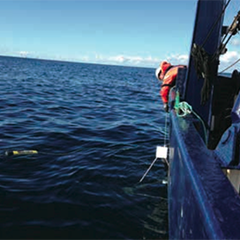From initial baseline ecological survey to impact assessment and the design and delivery of monitoring and mitigation schemes, Baker Consultants ensures ecological compliance for clients who are under increasing regulatory pressures. We took a look at the company’s recent work on the Borkum Riffgrund wind project.
The project
With a capacity of up to 277MW, and able to supply carbon-free power to nearly 285,000 German households’ annually, Borkum Riffgrund 1 is one of the largest offshore wind farms consented in German Waters.
In 2013 Baker Consultants was awarded the tender by GeoSea, part of DEME Group, for the environmental package of DONG Energy’s Borkum Riffgrund 1 wind farm construction. This consisted of monitoring the underwater noise levels and harbour porpoise activity during the installation of the wind farm foundations, as well as assessing the efficiency of the noise mitigation strategy.
Baker Consultants’ Marine team was involved from the early stages of the project, designing a methods statement for the monitoring campaign during installation to be approved by the German government. The project team then worked closely with the installation company (GeoSea), the piling company (IHC Hydrohammer) and the consent managers at DONG Energy, to ensure that mitigation protocols were followed and to advise on how to optimise the piling strategy whilst minimising the noise emissions.
Challenges
The project was subject to very strict licence conditions to monitor noise emissions during construction; the success of the noise mitigation strategy was critical to obtaining a release for the installation of all the planned monopiles.
The German government, through its BSH (Bundesamt für Seeschifffahrt und Hydrographie) maritime agency, has stringent regulations on noise emissions, with a threshold set at 160 dB (re 11Pa2 s) for the Sound Exposure Level (SEL), which had to be adhered to in order to ensure the success of the project. Initially, the licence consented the installation of the first twelve monopiles, further release was subject to the outcome of the noise measurements. Baker Consultants was required to produce timely reports so that BSH could approve further monopile release without causing delays to the client.



























